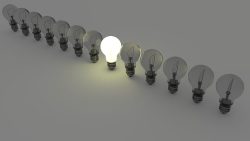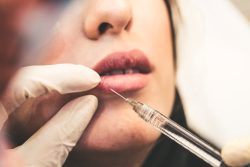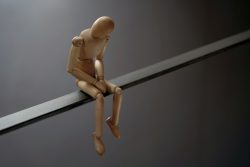Very often, I am accused of hypocrisy, of touting the importance of rest, but not doing it myself. Rest and sleep are incredibly important to human function. Unfortunately, the portion of my brain that regulates sleep is damaged. Indeed, I am as physically exhausted as the next person at times. My eyes become sore, and I become incredibly clumsy. My brain screams for sleep, but I am physically unable to sleep. My brain won’t turn off.
“Try melatonin or tea!” I have. “Try having a psychiatrist prescribe sleep aids!” I’ve done that. I wasn’t sure why they didn’t work but they didn’t, and they made my symptoms worse. Until last year, I thought I must have some form of extreme, treatment-resistant insomnia. After a routine MRI, my neurologist saw a brain abnormality indicating spinocerebellar ataxia. I now understood why the insomnia treatments didn’t work. I had organic brain damage, not psychiatric insomnia. My reason for poor sleep is not remotely psychological. Point blank. I have brain damage. My brain is unable to physically function in the same way as would a healthy one.
I want to make something crystal clear. Brain damage does not equal mental problems or mental incapacity. It is literally having a damaged brain. For example, my brain is damaged due to a stroke and subsequent coma. Miraculously, the damage was done mainly to my cerebellum. This affects primarily physical activity, such as speech and motor coordination. The lack of oxygen supply to my cerebellum caused it to atrophy. It is now only 2/3 the normal size. I now know that it has shrunk even more. I have only a quarter of my cerebellum functioning. This means I function at 25% of my physical capability and am required to work 4x harder than everyone else just to be able to speak and function in the same manner as them. I have no cognitive problems. This is a common misconception, that brain damage means some form of mental degradation. This is simply not true. There are numerous portions of the brain that can be damaged without affecting one’s cognitive function.
The Segmented Sleep Trend
Back to my problems with sleep. I have had severe and intractable insomnia since the injury. My sleep is highly segmented and I am lucky to get a few hours at a time. In trying to resolve this, I have done a lot of research. When I first began looking into segmented sleep, I almost doubled over in laughter. Apparently, segmented sleep is trendy and sought after. I suppose sleeping for several short periods throughout the day is cool. Much of my research on this subject yielded the benefits of segmented sleep. The underlying concept is that lesser amounts of sleep throughout the day can enhance productivity and foster a sense of greater rest. Proponents of segmented sleep proclaim that sleeping 8 consecutive hours is not natural and that since it was commonly used by our ancestors in pre-industrial times, perhaps we ought to use it as well. They contend that sleeping for an eight-hour spell is a recent phenomenon, only coming to pass in industrial human society as a means to live by a clock, rather than by nature and the sun. According to some professionals, segmented sleep, if used correctly, is beneficial and a more natural way to rest.
Many consider it contrary to circadian rhythms, however, and if segmented sleep is not by choice, it presents more problems than it solves. I agree. In my case, segmented sleep is not by choice. It is relative to the cerebellar injury I sustained years ago and presents many problems for me. I may not fall asleep until midnight but then I wake up at 3 am. I am exhausted by 7 am but must be awake all day. While sleeping for two, 4-hour stints may have been suitable at some point in history, it is not exactly wonderful with only one shorter stent and no ability to sleep later in the day. In this regard, the modern clock definitely affects sleep.
Negative Effects of Segmented Sleep
Strangely enough, this lack of sleep does not affect me negatively, cognitively. I honestly cannot explain that one. It does affect my ability to move and speak though. I am aware of my exhaustion when I have physical problems. The lack of sleep causes difficulty with movement and walking. My speech becomes slurred as if I am drunk. Since I have been sober for over 8 years, when this happens, I have to reassure those around me that I have not consumed any substances. At this point, most people in my life are aware of my situation and the cause of my slowed physicality.
At this point, the segmented sleep has been with me for years and no physician has been able to resolve it but I continue to research and seek help. I am planning to see a neurologist who specializes in sleep disorders soon. I am hoping that they can find a solution that my other doctors have not been able to. Sleep disturbances are not pleasant, no matter their origins. If anyone reading this also suffers from segmented sleep from cerebellar injury and has found resolution, please reach out.
For now, solidarity from yours truly at 3:04 am!
We Need Your Help
More people than ever are reading Hormones Matter, a testament to the need for independent voices in health and medicine. We are not funded and accept limited advertising. Unlike many health sites, we don’t force you to purchase a subscription. We believe health information should be open to all. If you read Hormones Matter, like it, please help support it. Contribute now.
Yes, I would like to support Hormones Matter.
Photo by Quin Stevenson on Unsplash.
This article was published originally on March 7, 2022.
















Bless you! Insomnia off and on since a very young teen….at menopause, lots of segmented sleep, even before that….diagnosed ASD1 at age 60…..Autistic people and sleep irregularities are not uncommon, from my readings…..I feel like an EEG and a Sleep Study should be the Standard of Care for anybody with a neurodiversity diagnosis, but, who am I? It was a small miracle that I was even able to find someone in Nashville, TN to appropriately diagnose me after sitting across from mental health professionals since I was 13. SMH…
Carnivore way-of-eating seems to be helping my sleep ….not perfect, but much improved…..guess my brain needed the fat/ketones….also Adrenal Cocktails from RCP…..not a panacea, just a help for struggling adrenals…..
Seems also like something was out-of-whack with my vagus nerve – had lots of dizziness, lack of coordination from time to time, for many years…..lack of sleep made it worse – high viral loads, post viral fatigue, etc.Epstein Barr….and others….sucky immune system, from infancy…..EONutrition with lots of info on Thiamine deficiency, since probably not absorbing much of anything very well….definitely not one of the fittest of survivors in my realm…..
Motherwort tea mixed into coffee sometimes knocks me out sitting up in a chair….
Was very hard to keep a job with segmented sleep for me….very difficult….
Hope you can get some rest/sleep.
Dear author,
In women, hormonal imbalance is a very common cause of disordered sleep, especially early morning awakening. Please try to find a functional medicine provider who understands the importance of progesterone (as well as estrogen and cortisol) who might be able to help you.
It may not be helpful but it’s worth looking into.